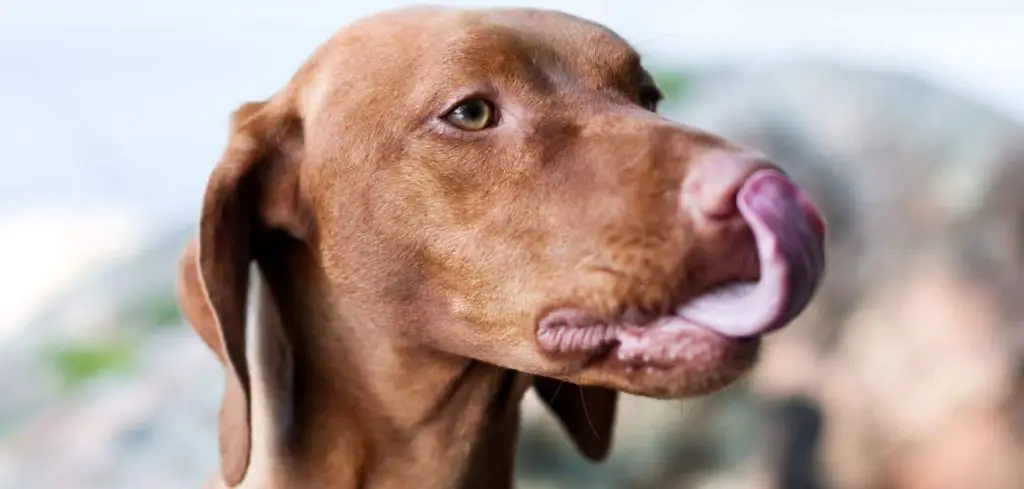It can be worrying when an old dog starts excessively licking their lips, especially if it happens frequently or without an obvious reason. This behavior may point to an underlying medical issue, discomfort, or even stress.
We outline the common causes of excessive lip licking in old dogs, what you can do at home, and when to seek veterinary help.
Old Dog Excessively Licking Lips — Why It Happens
When an older dog excessively licks their lips, it can indicate pain, nausea, dental problems, or anxiety. Dogs use lip licking as a natural behavior, but in senior pets, frequent or obsessive licking can signal something is wrong. Conditions like oral disease, digestive upset, dehydration, or even neurological changes may be at play.
In older dogs, it’s particularly important not to dismiss this symptom, as it can sometimes be an early warning sign of more serious health problems.

Old Dog Excessively Licking Lips: Common Causes
Dental Disease
Dental disease is one of the most common reasons for lip licking in senior dogs.
As plaque and tartar build up, gums can become inflamed and painful. Dogs may lick their lips to soothe irritation or discomfort in the mouth.
You may also notice bad breath, drooling, or difficulty chewing food.
For an old dog, untreated dental disease can lead to infections that spread to vital organs, making it a serious health issue.
Read more: Old Dog Breathing Heavy and Not Eating (Here’s why)
Nausea and Digestive Issues
Older dogs often experience digestive sensitivities, and nausea is a major cause of excessive lip licking.
Nausea can stem from dietary changes, gastrointestinal disease, or organ problems like kidney or liver disease. You might also notice pacing, drooling, or a refusal to eat.
Lip licking is a subtle way dogs try to cope with the queasy sensation, but in seniors, it should always be taken seriously.
Anxiety and Stress
Behavioral causes, such as anxiety, can also lead to lip licking.
Older dogs sometimes develop separation anxiety, confusion from canine cognitive dysfunction, or general stress from changes in routine.
Lip licking becomes a self-soothing behavior in these cases. Unlike short-term stress, chronic anxiety in older dogs can affect their overall health and quality of life.
Dehydration or Dry Mouth
As dogs age, they can become more prone to dehydration, especially if they are sick or on certain medications.
Dehydration causes a dry mouth, which leads to frequent lip licking. You may also notice sunken eyes, lethargy, or skin that doesn’t bounce back quickly when gently pulled. In older pets, dehydration can escalate quickly and requires prompt attention.
Neurological Conditions
Some neurological conditions can cause repetitive behaviors, including excessive lip licking.
Seizure disorders, canine cognitive dysfunction (similar to dementia), or neurological decline may trigger compulsive mouth movements. If your dog also shows signs of disorientation, tremors, or unusual behavior, neurological disease should be considered.
Pain or Discomfort
Pain anywhere in the body can trigger lip licking in dogs.
For example, arthritis, internal discomfort, or an undiagnosed illness can cause your old dog to lick their lips excessively. Since senior dogs often hide their pain, lip licking may be one of the few outward signs that something is wrong.
Read more: Dog licking lips excessively (What it really means)
What to Do If Your Dog Is Old and Excessively Licking Its Lips
If your senior dog is licking their lips excessively, start by observing when it happens and what other symptoms are present.
At home, check their mouth for obvious dental issues like inflamed gums or broken teeth.
Make sure fresh water is always available and encourage small, bland meals if you suspect nausea. Create a calm environment, especially if stress seems to be a trigger.
Comforting your dog, maintaining a predictable routine, and providing gentle companionship can reduce anxiety-related licking. However, if the behavior continues or worsens, professional guidance is needed.
When to Call or Visit Your Vet
You should seek veterinary care if your old dog’s excessive lip licking is persistent or accompanied by other warning signs.
Call your vet immediately if you notice drooling, gagging, vomiting, loss of appetite, or signs of pain. Any neurological changes such as disorientation, tremors, or sudden behavior changes also warrant urgent attention.
Since senior dogs are more vulnerable, early intervention is crucial to rule out serious conditions and ensure they remain comfortable.
Read more: Dog Panting and Licking Lips Excessively (What it means)
Key Takeaway
Excessive lip licking in an old dog is rarely just a harmless habit. It can point to dental problems, nausea, stress, dehydration, pain, or neurological disease.
While you can make small adjustments at home to keep your senior dog comfortable, ongoing or worsening lip licking should never be ignored.
Reaching out to your veterinarian ensures the underlying cause is addressed, giving your dog the best chance at relief and a better quality of life.
